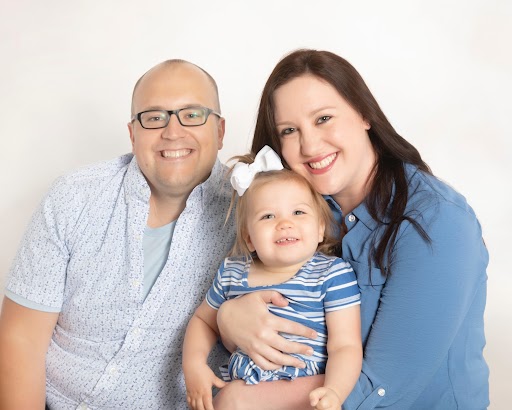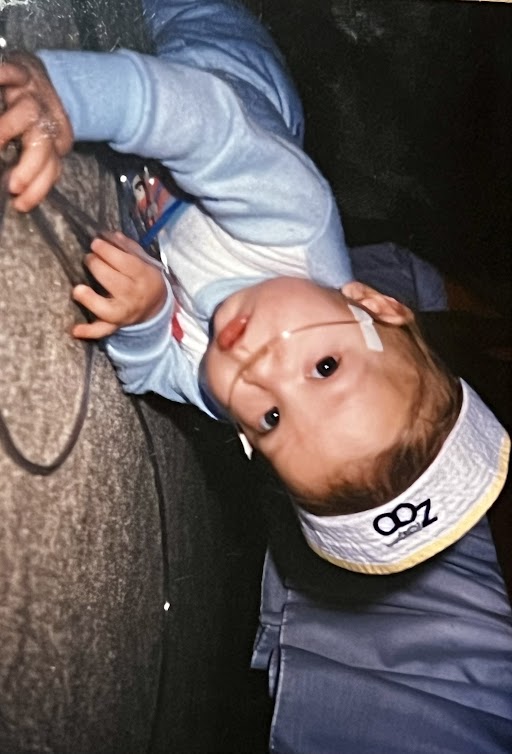
But the outlook wasn’t always as positive for Evan and his family as it is today.
Rewind to the year 2020. Evan and his wife, Rachel, were expecting their first child. Rachel was several months pregnant and in the process of completing years of study for a PhD. It was during this time that Evan noticed that something wasn’t quite feeling right with his health. He started having difficulty going up and down stairs without losing his breath or wheezing.
“We were juggling a lot in our lives at the time, and I was noticing a gradual decline in my physical abilities. Simple things like walking around the house or standing up were starting to wear me down,” Evan recalls. “I am a former college athlete, and I knew I should not be feeling like this.”
With the pregnancy progressing, Evan and Rachel decided he needed to see a doctor and get to the bottom of what was going on as soon as possible. A chest X-ray soon revealed something he was not expecting: a recurrence of congenital diaphragmatic hernia (CDH), a condition Evan was treated for as an infant.
“Honestly, CDH had not crossed my mind for over two decades,” Evan said. “We couldn’t believe it was back.” He initially had a very difficult time finding someone to care for him now that he was an adult and even underwent an unsuccessful attempt at surgery. Fortunately, Evan soon found himself under the care of the affiliated adult CDH team at Children's Memorial Hermann Hospital. The team treated Evan and skillfully performed a successful surgery by retracing the same surgical path taken over 30 years earlier.
A happy and resilient childhood
Evan was born in Milwaukee, Wisconsin in the spring of 1989. His mom, Deb, never had an ultrasound during her pregnancy and had no reason to expect any health issues once her son was born.
“Right after Evan’s birth, the doctors who delivered Evan knew that something was wrong. He was transported to the local children’s hospital immediately,” according to Deb. “It was scary. He was put on ECMO, and I was told he would need CDH surgery right away.” Extracorporeal membrane oxygenation (ECMO), also known as extracorporeal life support (ECLS), is an advanced life support treatment for critically ill patients with life-threatening heart and/or lung problems.

According to the Centers for Disease Control and Prevention, CDH affects over 1,000 babies born each year in the United States. Evan was one of those babies nearly 33 years ago, and received immediate care.
Fortunately, Evan’s surgery as a newborn was a success. , as was the standard of care at the time.
Remarkably, Evan was able to gain strength as an infant and quickly put the CDH surgery behind him. His family says he was a tough kid, enjoying an active, year-round sports lifestyle that carried him all the way to collegiate football. Throughout his childhood and adolescence, the once life-threatening diagnosis with CDH as a newborn baby was now a total non-factor. It had all felt like a big success story.
Recurrence of CDH as an adult
Like Evan, people born with CDH can sometimes, have a recurrence, as babies, children, adolescents or even as adults. Essentially, the previous repair of a CDH patient’s diaphragm can fail and allow the organs back into the wrong spot, as their once tiny baby muscles and organs grow into their full adult-sized form. As the patient grows, if a re-herniation occurs, abdominal organs can move back into the chest cavity and cause a host of health issues.
Diaphragm hernia recurrence is not the only challenge CDH patients can face. Adults with a CDH can range from completely asymptomatic and healthy to having a myriad of ongoing health care needs. Most adults with CDH may have health challenges that frequently include most commonly face respiratory challenges, gastrointestinal (GI) issues, and/or orthopedic complexities, though a wide range of health care needs can emerge. Women born with CDH may also face nuanced challenges specific to family planning and/or high-risk pregnancy concerns throughout various phases of life. Without appropriate care, CDH occasionally can even become life-threatening.
Evan has been a Houston resident since 2015. It was five years later, in 2020, when he sought care at a local Houston hospital, finding out via X-ray that he was having a recurrence of CDH. He was hoping for a solution, but unfortunately his initial care led to a surgical outcome that was not what he had hoped for, and the initial operation left him with more damage than improvement.
“We were really frustrated,” Evan said, reflecting on how the unsuccessful surgery made him and his family feel. “When something like that happens, it’s hard not to lose hope. But I was determined to keep fighting, to keep going. At that point, my daughter had just been born. I could not give up. So, I started scouring the internet for surgeons specializing in CDH.”
That’s when Evan came across the Congenital Diaphragmatic Hernia Study Group (CDHSG), an international consortium of centers that prospectively collect and voluntarily contribute data about live-born CDH patients they manage. These data are compiled to form a registry from which any participating center may utilize the dataset to answer specific clinical questions and monitor outcomes. To date, the voluntary collaborative has tracked the outcomes of more than 14,000 patients with CDH to gain knowledge of the effects of the disease, interventions and outcomes. The registry, which resides at Children’s Memorial Hermann Hospital and UTHealthHouston, represents centers globally.
Evan then found the name of the doctor leading this global CDH effort: Dr. Matthew Harting, MD, a pediatric surgeon affiliated with Children's Memorial Hermann Hospital. And even better, this internationally recognized doctor was right down the street in Houston, in the heart of the Texas Medical Center.
Finding hope for adult CDH
When Evan first contacted the affiliated adult CDH team, it was apparent that he and his family had done a lot of research and were desperate for a solution. X-ray imaging confirmed that he had an adult recurrence of CDH.
During their consultation, Dr. Harting instilled hope, assuring Evan that he could perform the surgery at Memorial Hermann – Texas Medical Center with success, despite prior challenges.
“When we first met Evan and his wife, they were concerned that there may not be a solution or that there may not be surgeons willing to or capable of fixing this problem. Evan’s surgical procedure involved going through his original incision from birth, which meant encountering a considerable amount of scar tissue,” said Dr. Harting. “We navigated through Evan's abdomen into his chest, realigning his kidney, omentum and intestines back into their correct positions. Then a patch was placed to repair the hole in his diaphragm, reinforcing it and effectively correcting the CDH.”
Evan’s family affectionately refers to his patch as his “Superman” patch. Within a couple weeks, he began to feel like his old self again. His family was ecstatic.
“If it wasn’t for the adult CDH care available at Memorial Hermann, I’m not sure where I would be today. I have a newfound vigor that allows me to fully engage with our energetic and vibrant daughter, Hattie. I am able to live a normal, day-to-day life as a new dad, and I couldn't be more grateful,” Evan said. “I’ve even resumed a once-forgotten dream to hike to the highest point of every state in the U.S. with one of my good friends. A few years ago, I couldn’t even make it up a staircase without being exhausted. I’m living a great life now.”
Adult congenital diaphragmatic hernia clinic
Evan's journey stands as a testament to the importance of specialized care for adults with CDH. Nearly universally, infants born with CDH will receive care at a children’s hospital and that care continues until they are 18 years old, leaving them with no continuation of care as they enter adulthood. Children’s hospitals focus on children. Adult hospitals and physicians don’t routinely care for patients like this, with this type of congenital anomaly. As Evan’s story showcases, leading adult hospitals and physicians may not be facile or comfortable managing complex congenital anomaly patients, resulting in a stressful and uncertain transition as these patients effectively head out into the unknown with limited resources.
“Some adults with CDH are doing great – they may simply want reassurance that their excellent health will likely continue. Unfortunately, others aren’t, and we want to help every patient with CDH live their best life,” said Dr. Harting. “We’ve assembled a diverse, multidisciplinary team of both adult and pediatric affiliated providers to ensure seamless care from prenatal and infant stages through adulthood – all in a single, tailor-made facility. CDH specialists with backgrounds in pediatric surgery, thoracic surgery, pulmonology, adult general surgery, and OB/GYN all work together to treat CDH patients throughout their entire lifetime.”
“My life has been forever changed for the better because of Dr. Harting, the whole team, and Memorial Hermann. I hope that other adults with CDH are able to find the same hope and success that I found with the adult CDH team,” said Evan. “When you are your own advocate and don’t lose hope, anything is possible.”
Learn more about adult CDH care available at Memorial Hermann »